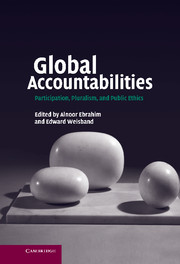Book contents
- Frontmatter
- Contents
- List of tables
- List of figures
- Acknowledgments
- List of contributors
- 1 Introduction: forging global accountabilities
- Part I Public accountability: participatory spheres from global to local
- Part II Experiments in forging NGO accountability: mutuality and context
- Part III Reflective accountability: new directions for participatory practices
- Part IV Global accountability frameworks and corporate social responsibility
- Index
- References
1 - Introduction: forging global accountabilities
Published online by Cambridge University Press: 22 September 2009
- Frontmatter
- Contents
- List of tables
- List of figures
- Acknowledgments
- List of contributors
- 1 Introduction: forging global accountabilities
- Part I Public accountability: participatory spheres from global to local
- Part II Experiments in forging NGO accountability: mutuality and context
- Part III Reflective accountability: new directions for participatory practices
- Part IV Global accountability frameworks and corporate social responsibility
- Index
- References
Summary
Accountability is a confusing term, one that readily confounds efforts at precise definition or application. On one hand, its implementation is regarded as a kind of panacea with respect to the need to prevent and, whenever necessary, to punish unethical, illegal, or inappropriate behavior by public officials, corporate executives and nonprofit leaders. The refrain is by now familiar: act against sham deals, accounting tricks, securities fraud, personal use of charitable and public funds, exchange of political favors and monies, and so on. The “problematics” of accountability are accordingly framed in terms that underscore the ever-present risks of deliberate malfeasance perpetrated by individuals acting to aggrandize themselves. The commonly espoused “solution” is predictable: better oversight through tougher regulation, combined with harsh penalties as a deterrent. The magic wand of accountability is similarly seen to be at play in instances of global and state governance, where it is regarded as a supervening force able to promote democracy, justice, and greater human decency through the mechanisms of transparency, benchmarked standards, and enforcement.
In recent years, however, the analytical domains of accountability have become so extended that the very precision once conveyed by the concept has become eroded. This has generated widespread concern that the term will become devalued or incapacitated through overuse. “Appropriated by a myriad of international donor and academic discourses,” write Newell and Bellour (2002, p. 2), “accountability has become a malleable and often nebulous concept, with connotations that change with the context and agenda.
- Type
- Chapter
- Information
- Global AccountabilitiesParticipation, Pluralism, and Public Ethics, pp. 1 - 24Publisher: Cambridge University PressPrint publication year: 2007
References
- 13
- Cited by



